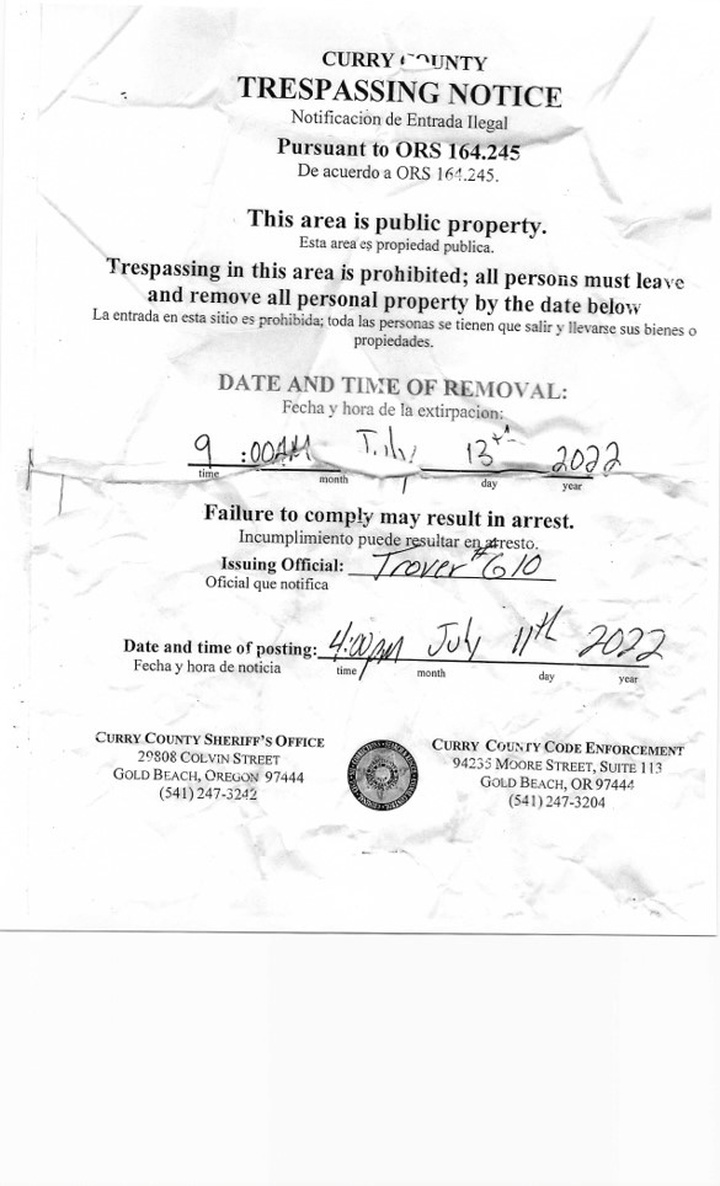Jessica Cejnar Andrews / Monday, July 15, 2024 @ 2:20 p.m. / Homelessness, Local Government, Oregon
Disabled Man Sues Curry County Sheriff and Staff, Alleging Unlawful Citation For Criminal Trespassing

John Malaer (left) speaks with Curry County Sheriff's Deputy Kenneth Moore in July 2022 just before he received a citation for criminal trespassing. | Photo courtesy of LeDuc Montgomery LLC
(Updated at 8:28 a.m. to correct a quote from attorney Alicia LeDuc Montgomery.)
A 65-year-old paraplegic man is suing Curry County, alleging that on July 13, 2022, the sheriff’s office unlawfully cited him for criminal trespassing on public property in Harbor, Oregon, two days after the county had leased that property to a private party for $1 per year.
John Lee Malaer’s campsite near 97921 Shopping Center Avenue provided access to an electricity source to charge his wheelchair, a place to care for a neurogenic bladder condition and was near Brookings CORE Response, which serves the unhoused.
Malaer's complaint, filed in the United States District Court in Medford last week, alleges that the county leased the land to Ue Ching Ow for $1 per year for five years.
The lease is dated July 11, 2022 — the same day Code Enforcement Officer Marvin Trover posted a trespass notice near Malaer’s tent stating he was unlawfully camping on public property.
The complaint also alleges that on July 13, 2022, Curry County Sheriff’s deputies threatened to arrest Malaer if he didn’t vacate the property and waited until legal observers had left before sweeping his campsite and citing him.
“This is a really concerning tactic deployed by the county to lease land, public property, and convert it to private use just for this malicious purpose of making life harder for homeless disabled folks,” said Alicia LeDuc Montgomery, whose Battle Ground, Washington, firm, LeDuc Montgomery LLC, is representing Malaer. “I think it’s immoral as well as illegal and doesn’t meet requirements under the leasing statute.”
Malaer is also represented by J. Ashlee Albies from the Portland firm Albies & Stark LLC. The plaintiff is seeking a jury trial and is asking for compensatory and punitive damages as well as declaratory relief.
Declaratory relief means that the plaintiff is asking the court to determine if both the county’s trespass notice and its lease with Ow is valid, LeDuc Montgomery told the Wild Rivers Outpost on Monday.
The suit also seeks “exemplary and punitive damages” against the individual defendants, who include Sheriff John Ward, former commissioner Christopher Paasch, then-sheriff’s deputies Jordan Rhodes and Kenneth Moore and then-code enforcement officer Melvin Trover.
Moore is currently employed by the Gold Beach Police Department, according to the complaint.

A lawsuit alleges Curry County's trespass notice against John Malaer violated state and federal statutes. | Photo courtesy of LeDuc Montgomery LLC
Attorneys for the plaintiffs still need to serve the defendants, LeDuc Montgomery said. She said she doesn’t expect an official response from the county for at least another month.
When reached by phone Monday, Ward declined to comment about the lawsuit.
The Outpost also attempted to reach Curry County's current attorney, Ted Fitzgerald, via email on Monday.
The plaintiff’s attorneys claim that Curry County violated his civil rights under the Americans with Disabilities Act and the 14th amendment to the U.S. Constitution. The lawsuit also claims that Curry County acted out of compliance with an Oregon statute governing the removal of homeless individuals camping on public property.
Under ORS 195.505, a trespass notice must provide at least 72 hours notice before law enforcement sweep a campsite. The notice must also state where homeless individuals can claim their property.
The county’s notice did not have that information, the lawsuit states.
According to LeDuc Montgomery, Trover acknowledged on July 12 that the notice was based on outdated state law when speaking with Reverend Cora Rose, an attorney who leads the legal aid ministry at St. Timothy Episcopal Church.
Trover told Rose that the county would not take action against Malaer, but sheriff’s deputies arrived at plaintiff’s campsite the following day and began enforcing the notice, LeDuc Montgomery said.
According to the complaint, deputies Rhodes and Moore issued verbal warnings to roughly six or seven individuals, stating that if they were there after 6:30 p.m., they would be arrested. Rose and other “legal observers” saw the deputies interacting with Malaer.
“Mr. Malaer was on the ground in his tent with his wheelchair visible,” the complaint states. “During the conversation, Deputy Moore was informed that a separate notice had been posted the day before by the next door liquor store. Officer Moore responded the liquor store ‘now owns the property, ok.’ The liquor store referenced was Brookings Liquor Store.”
According to the complaint, Malaer told deputies that he would leave the area, but he was permanently disabled, didn’t know where else he could camp and had no resources to secure shelter.
Moore told Malaer that if he had concerns he could talk with his superior, Lt. John Ensley and promised to “have him come by your way.”
“Shortly after that was when Rev. Rose and the legal observers left,” LeDuc Montgomery told the Outpost. “Twenty to 30 minutes after they leave, officers come back and criminally cite Mr. Malaer.”
The lawsuit also alleges that the county’s lease with Ow did not provide meaningful revenue or public benefit and was not in compliance with ORS 271.310, which governs the transfer or lease of real property by the government.
According to the complaint, the plaintiff’s lawsuit alleges that the county executed the lease with Ow “for the purpose of subverting the protection afforded to unhoused residents camping on public property.”
ORS 271.310 also states that the county must determine the land wouldn’t be needed by the public within the term of the lease, LeDuc Montgomery told the Outpost.
“I don’t know how [the county] could say the lease would meet any of those criteria when you have the most vulnerable and destitute in the community living on the property … and how any of that could be outweighed by a $1-a-year revenue stream,” she said. “The folks living there would have paid $2 a year to continue staying there.”
On July 6, 2022, the Curry County Board of Commissioners discussed vacating the property on Zimmerman Way and transferring ownership to Premier Ocean Properties property manager Ron Reel, who managed the nearby liquor store. However, according to LeDuc Montgomery, there’s nothing on the county’s website that mentions the $1-per-year lease with Ow.
“At the time the county posted their trespassing notices, they said, 'you’re trespassing on public property, not private property,'” LeDuc Montgomery said. “The county’s in very conflicting behavior there, especially when you have the county counsel’s office saying, 'We won’t take action; we will get this resolved and make sure everything’s legal first.' And at the same time, the county’s [negotiating] this lease and not telling people or posting beforehand.”
When asked how Malaer’s case compares to Grants Pass v. Johnson case, which the U.S. Supreme Court ruled on last month, LeDuc Montgomery said that case stated that concerned whether anti-camping laws were unlawful under the Eighth Amendment’s prohibition against cruel and unusual punishment.
Malaer’s case, however, states that citing and threatening the plaintiff with arrest for criminal trespassing violated right to due process under the 14th Amendment to the U.S. Constitution, LeDuc Montgomery said.
“We’re bringing due process claims, [which] the Supreme Court just ruled is an appropriate avenue to challenge these types of unfair homelessness enforcement processes,” she said.
CLICK TO MANAGE